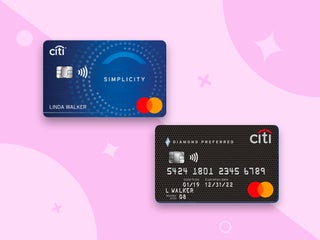Summary
The titanium Apple Card is stylish, and it offers strong perks while charging no fees. But compared to other metal credit cards, it’s not necessarily the most coveted or rewarding option. Here’s how the Apple card stacks up to other metal credit cards.
The content on this page is accurate as of the posting date; however, some of our partner offers may have expired. Please review our list of best credit cards, or use our CardMatch™ tool to find cards matched to your needs.
Some of the offers below are no longer available and may be out of date.
If you’re looking to make a statement with your credit card, choosing a sleek metal card, such as the Apple Credit Card, is a good way to do it.
Your card will not only look more “chic” than the average plastic credit card; it will also feel smoother and heftier between your fingers. You may even hear a satisfying clink when you drop your card on your restaurant or bar tab.
But unlike most metal credit cards, Apple’s new no-annual fee titanium card – which began to roll out in August – lets you flash the stylish metal without actually having to pay for the privilege of owning a metal card. Most metal credit cards charge annual fees ranging from $95 to $450 a year or more and, as a result, serve as a visual reminder to people nearby that you’ve got the cash to pay for more generous rewards.
The Apple credit card, by contrast, not only waives annual fees. It doesn’t charge any fees at all – including penalty and transaction fees.
The Apple card also offers a number of strong perks, including 3 percent cash back on Apple purchases and select merchants when you pay via Apple Pay (currently Uber, Uber Eats, Walgreens, Duane Reade and T-Mobile), and 2 percent cash back on mobile wallet purchases. But compared to other metal credit cards, it’s not necessarily the most coveted or rewarding option. Here’s how the Apple card stacks up to other metal credit cards.
See related: Apple Card: Worth its weight in titanium?
Apple Card: Affordability
If you’d like something heavier and more substantive than the typical plastic credit card, but don’t want to pay a big price for it, the Apple credit card is by far your most affordable option.
The only other no-annual-fee metal credit cards that are widely available – the Wells Fargo Propel American Express® card and the Amazon Prime Rewards Visa Signature card (which requires a $119 Prime subscription) – charge more fees.
They also charge significantly higher APRs. The Apple credit card, for example, advertises an unusually low minimum APR of 13.24 percent and a maximum APR of 24.24 percent. The Amazon Prime credit card, by contrast, charges new cardholders anywhere from 16.49 percent to 24.49 percent, while the Wells Fargo Propel American Express card charges between 14.49 percent and 24.99 percent variable.
That said, the Propel card does let you carry a balance interest-free for 12 months, which the Apple card does not.
Apple Card: Rewards
Where the Apple card falls short is in the rewards it offers – particularly if you stick to only using your physical card. Unless you’re shopping at the Apple Store or using the card via Apple Pay at one of a few select merchants, which garners 3 percent cash back, you’ll only get 1 percent cash back on purchases that you make with your metal card. You’ll get 2 percent cash back if you pay with your Apple wallet instead – but then you won’t get to flash your sleek rectangle of metal and you’ll be limited to retailers that accept contactless payments.
With the metal Wells Fargo Propel American Express card, by contrast, you’ll earn an impressive 3 points for every dollar you spend on a wide variety of everyday purchases, including restaurant and delivery purchases, gas stations, public transportation and popular streaming services.
You’ll also get 3 points per dollar spent on travel purchases, such as airfare, hotels and car rentals. Meanwhile, the metal Amazon Prime card offers 5 percent back on Amazon and Whole Foods purchases and 2 percent back on dining, gas and drugstore purchases.
See related: Apple Card Daily Cash: Deep dive
Apple Card: Sign-up bonus
So far, Apple hasn’t announced a sign-up bonus for the new Apple card. But if Apple does decide to offer one, they’ll face some stiff competition.
The Amazon Prime card offers just a $75 gift card. However, the Wells Fargo Propel card offers a 20,000-point bonus that’s worth $200 in free travel when you spend $1,000 on purchases in the first three months – which is a lot for a no annual fee card.
If you’re willing to commit to an annual fee, you could claim an even bigger bounty. For example, the metal Chase Sapphire Preferred Card offers 60,000 bonus points worth $750 in free travel after spending $4,000 on purchases in the first 3 months, while the metal Capital One Venture Rewards Credit Card offers 50,000 bonus points worth $500 in travel after spending $3,000 on purchases in the first 3 months.
The Platinum Card® from American Express – a longtime metal status symbol – offers a 75,000-point welcome bonus after spending $5,000 in the first 6 months to those who can afford a $550 fee.
Apple Card: Benefits
Apple doesn’t currently advertise any traditional card benefits, such as travel insurance or purchase protection. However, the Apple Card does advertise a unique spending app that’s designed to help you visualize your spending, track your rewards earnings and estimate any impending interest charges.
That’s a nice perk for cardholders who could use some extra help making decisions. However, if you plan to buy travel or make big-ticket purchases, you may miss having access to other card benefits, such as car rental insurance or extended warranty.
Both the Amazon Prime card and the Wells Fargo Propel card, by contrast, offer a strong suite of purchase and travel protections. The Wells Fargo Propel card even offers cell phone insurance, which is a great perk for those with expensive iPhones.
See related: Guide to the new Apple
Apple Card: Style
Not surprisingly, the Apple card rises to the pack when you rate it solely on visuals.
Like many Apple products, it’s beautiful to look at, with clean, modern lines, an instantly recognizable Apple logo and a bright silver exterior. (However, you might want to keep it away from denim, leather and your other credit cards, according to the Apple Card cleaning guide.)
The Apple Card is also fairly heavy. It weighs slightly less than the chunkiest metal credit cards, coming in at around 14.75 grams.
However, it’s heftier than both the Chase Sapphire Preferred Card and the Chase Sapphire Reserve card, according to a recent product test by The Points Guy. It also beats the American Express® Gold Card, the Marriott Bonvoy Brilliant American Express card and the Citi Prestige® Card
If you want something heavier, you’ll likely have to pay for it. The weightiest metal cards are all super premium credit cards with huge annual fees, including the Mastercard® Black Card™, the American Express Platinum card, the Ritz-Carlton Rewards Credit Card from Chase and the U.S. Bank Altitude Reserve Visa Infinite Card. The Points Guy’s test found that many of the most expensive credit cards weigh down wallets by as much as 16 to 22 grams.
See related: The best credit cards for Apple purchases
Apple Card: Bottom line
When you pay with a metal Apple Card, you’ll be wielding a beautifully designed card that feels substantial in your fingers. However, unlike other metal cards, the Apple Card doesn’t necessarily convey that you’re well-off or rewards savvy.
Instead, people who are in the know who see you use a physical Apple card anywhere but Apple may get the impression that you value style and affordability, but not necessarily rewards.
Editor’s note: This story was updated on Sept. 20, 2019 to reflect the addition of T-Mobile as a 3 percent bonus category on the Apple Card.
Editorial Disclaimer
The editorial content on this page is based solely on the objective assessment of our writers and is not driven by advertising dollars. It has not been provided or commissioned by the credit card issuers. However, we may receive compensation when you click on links to products from our partners.



